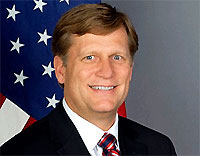Vector of Russia-U.S. Relations Under Putin to Remain Basically Unchanged — U.S. Ambassador
Interfax - 5.12.12 - JRL 2012-87
MOSCOW. May 12 (Interfax) - U.S. Ambassador to Russia Michael McFaul believes that Moscow's policy toward the United States will not change under President Vladimir Putin.

file photo "Now that Russia's elections are over, the hyperbolic and inaccurate attacks on my country in the press and internet have receded, though of course sincere criticisms of our foreign and domestic policies remain," McFaul wrote on his blog.
"And most importantly, we have received clear signals from Russian officials that the change in presidents in Moscow will not lead to a change in policy towards the United States," he said.
The so-called reset policy has been tested by "unexpected new agenda items in our bilateral relationship, such as Syria," he said.
"So did Russia's electoral politics, which generated anti-American rhetoric. For some outside analysts, the transition from President Medvedev to President Putin also fueled doubts about continuity in our bilateral relations. When I arrived one hundred days ago, all of these factors intersected to create an uncertain moment in U.S.-Russia relations," he said.
At the same time, McFaul said it is clear to him that "the basic trajectory in U.S.-Russia relations is continuing, not changing."
"Russia and the United States continue to cooperate on Iran, North Korea, and Afghanistan. Even our approaches to Syria are much closer today than they were at the beginning of the year," he said.
Economic relations between the two states are also developing dynamically.
"In 2011, U.S.-Russia trade reached an all-time high of $42.9 billion," he said.
Keywords: U.S.-Russian Relations - Russian News - Russia
MOSCOW. May 12 (Interfax) - U.S. Ambassador to Russia Michael McFaul believes that Moscow's policy toward the United States will not change under President Vladimir Putin.

file photo "Now that Russia's elections are over, the hyperbolic and inaccurate attacks on my country in the press and internet have receded, though of course sincere criticisms of our foreign and domestic policies remain," McFaul wrote on his blog.
"And most importantly, we have received clear signals from Russian officials that the change in presidents in Moscow will not lead to a change in policy towards the United States," he said.
The so-called reset policy has been tested by "unexpected new agenda items in our bilateral relationship, such as Syria," he said.
"So did Russia's electoral politics, which generated anti-American rhetoric. For some outside analysts, the transition from President Medvedev to President Putin also fueled doubts about continuity in our bilateral relations. When I arrived one hundred days ago, all of these factors intersected to create an uncertain moment in U.S.-Russia relations," he said.
At the same time, McFaul said it is clear to him that "the basic trajectory in U.S.-Russia relations is continuing, not changing."
"Russia and the United States continue to cooperate on Iran, North Korea, and Afghanistan. Even our approaches to Syria are much closer today than they were at the beginning of the year," he said.
Economic relations between the two states are also developing dynamically.
"In 2011, U.S.-Russia trade reached an all-time high of $42.9 billion," he said.